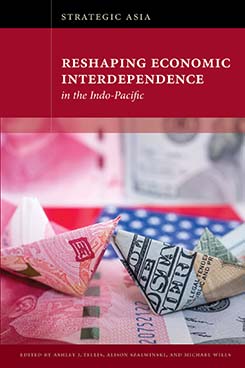Taiwan: Walking the Tightrope between the United States and China
This chapter examines the implications of U.S.-China decoupling for Taiwan’s integration with the Chinese and world economies and explores how this economic fragmentation is shaping the context in which the Taiwanese are determining their island’s future.
EXECUTIVE SUMMARY
MAIN ARGUMENT
As the U.S. and Chinese economies decouple, Taiwan is navigating challenges posed by strategic competition between two great powers. In an increasingly fragmented global economy, Taiwan shares democratic values and strategic goals with the U.S. However, U.S. policies aiming to retain technological supremacy over China, especially in the semiconductor sector, lack coordination with Taiwanese and international stakeholders and are hurting Taiwan, whose growth depends on global economic integration, particularly with the Chinese market. This has raised doubts about U.S. leadership within Taiwanese society, which is grappling with domestic challenges to economic resilience amid deepening political polarization. How the U.S. engages with Taiwan will not only shape perceptions of the U.S. but also influence Taiwan’s ability to support U.S. strategic goals in competing with China.
POLICY IMPLICATIONS
- The U.S. must reassess semiconductor reshoring policies, analyze the impact of its export controls and investment restrictions on Taiwan and other partners in Europe and Asia, and offer concrete incentives to ensure ongoing compliance.
- The U.S. must engage Taiwan’s business community, government, and civil society when considering new rules for regional and international economic collaboration to maintain trust and support from Taiwanese society.
- The U.S. must continue supporting Taiwan’s pursuit of deeper regional economic integration and greater international involvement, which remain vital for enhancing Taiwan’s resilience and capacity to contribute to the U.S.-led liberal order.
Syaru Shirley Lin is Founder and Chair of the Center for Asia-Pacific Resilience and Innovation, Research Professor at the Miller Center of Public Affairs at the University of Virginia, and a Nonresident Senior Fellow in the Foreign Policy Program at the Brookings Institution.
Strategic Asia
The Strategic Asia annual edited volume incorporates assessments of economic, political, and military trends and focuses on the strategies that drive policy in the region. Learn more about Strategic Asia.



